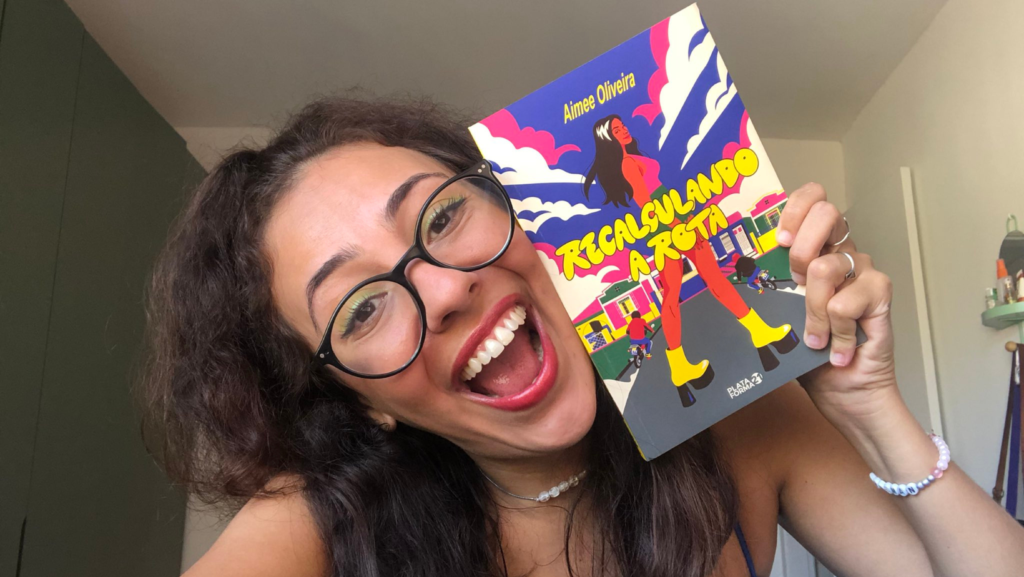In the suburbs of Rio de Janeiro, young Vivian fights daily for a better life, facing the challenges of the outskirts alongside her mother, grandmother, sister and niece. In the midst of this journey, the arrival of her ex-boyfriend Vinícius, recovering from a motorcycle accident, turns her world upside down. This is the starting point of “Recalculando a Rota” , the new contemporary novel by award-winning Rio author Aimee Oliveira , published by Plataforma21.
With a narrative full of emotions, conflicts from the past and the incessant search for her dreams, Vivian aims to open her own aesthetic clinic to serve the residents of the outskirts. In a setting filled with rap, samba and pagode music, the author, winner of two Wattpad Wattys awards , addresses topics such as sisterhood, friendship and the strengthening of family ties.
“Recalculating the Route”, with cover design by Paula Cruz, is a celebration of the resilient spirit of young Brazilian women who never give up on their ideals, even in the face of the greatest challenges. With humorous writing and authentic characters, Aimee Oliveira delivers a coming-of-age story that promises to delight readers.
“Recalculando a Rota” is set in the suburbs of Rio de Janeiro and focuses on the life of a struggling young woman. What inspired you to create the character Vivian and set the story in this setting?
I have always lived in São Gonçalo and attended college in Rio de Janeiro. The two cities are forty minutes away from each other when there is no traffic. The problem is that, in general, there is always traffic and this time spent on public transport made me think a lot about the differences between one place and another and that was my main inspiration for creating “Recalculating the Route”.
The relationship between Vivian and Vinícius is central to the plot, especially with the “lovers-to-enemies-to-lovers” theme. What was it like developing this dynamic and what did you want to convey with this second chance for their relationship?
Writing Vivian and Vinícius’ interactions was a lot of fun, because even though they have a lot of issues to resolve, there is clearly still a strong attraction between the two. Furthermore, I really wanted it to be a light narrative, so while I was writing I always tried to balance the conflicts with funny dialogues and little peculiarities of their relationship. My main intention when developing the plot between the two was to show that people can change, that maturity makes us understand a lot of things that we couldn’t accept when we were younger, and that it’s very special when we have the opportunity to rebuild our relationships based on this learning.
Vivian faces many typical challenges of life on the Brazilian outskirts. How do you balance portraying these challenges with the character’s resilience and optimism?
I believe that Vivian is far from being the only one trying to balance work, studies, dreams and lack of money, the inspiration for her to be like this comes from millions of other young people who are also in a rush to achieve their place in the world and who continue to fight despite the many sorrows they face. Most young Brazilians live this type of reality, at least on some level, and I see a certain poetry in this juggling act that we do to achieve our goals, however crazy they may be: wanting to make a living from Literature in Brazil, for example. .
The presence of four strong women in Vivian’s life, I would say, is one of the highlights of the book. Can you tell us a little more about the importance of sisterhood and female support in history?
The House of Five Women , as it is called in the book, was a set that I loved building. I wanted it to be a welcoming and energetic place, I just didn’t expect that I would also feel embraced by this atmosphere. These women, each in their own way, exude strength, attitude and determination, which ends up being the cause of some conflicts throughout the plot. Especially at the time when Vivian’s grandmother decides to welcome Vinícius into the house, going against Vivian’s decision to stay as far away from her ex-boyfriend as possible. Witnessing the explosion caused by the friction generated by these strong personalities was very satisfying.
Music seems to play an important role in “Recalculando a Rota”, with references to rap, samba and pagode. How did you choose these soundtracks and what impact did they have on the narrative? Did you put together a playlist ?
Yes, I put together a playlist ! In fact, I’m still building it, because I think it will be forever under construction. I like to add songs as I discover new things that match the mood of the book. The music in Recalculando a Rota establishes the rhythm of events, the atmosphere of the neighborhood and sets the love story of Vivian and Vinícius. I can’t wait for readers to enjoy the songs I chose with so much care to build the world of Recalculando a Rota! And I would like to mention that, in addition to representing the mood of the book, this playlist is great for dancing or tidying up the house. Or cleaning the house while dancing, which is my favorite combination.
Opening an aesthetic clinic is Vivian’s big dream. What motivated you to choose this profession for the character and how does this reflect the themes of empowerment and self-esteem in the book?
I love thinking about professions that aren’t portrayed much in the books I usually read, especially those that don’t require a higher education degree to be practiced. In Recalculating the Route, Vivian takes a technical course while pursuing her dream of opening the clinic. I believe that my impulse to always look for unconventional occupations comes from the fact that, when I was in school, the only career options that were presented to me were those that involved college. My high school was very focused on the challenge of passing the entrance exam, which, I admit, is not easy. However, I believe that the biggest challenge is to make people so young make a choice as serious as the profession they will pursue for the rest of their lives in mid-adolescence, which, in itself, is already a difficult period, with its own challenges. I really like writing about this period after high school, when many of us have to learn that it’s normal for us to have to recalculate the path of our lives from time to time and that choosing a profession is also part of this process.
You have already won two Wattys awards and are the author of other novels such as “Slope Down”. How does Recalculating the Route compare to your previous works in terms of theme and approach?
Although my books are very different from each other, they all have something in common: the maturity that we are forced to have in our youth, sometimes against our will. This transition to adulthood has its pains and delights and it is precisely these that I like to talk about in my books. That is, in addition to writing cute and quirky couples that make my heart flutter as I imagine what will happen between them.
Winning the Wattys award in 2015 was one of the first signs I had that following my dream of being a writer wasn’t completely crazy. Invisible, which was the award-winning work that year, gained more than 2 and a half million readings and opened the doors for many readers to get to know my writing. Several of them continue to read me to this day, nine years later. This is more unbelievable than I can express.
“Recalculating the Route” features humorous writing and realistic characters. What are the challenges and rewards of writing stories that reflect the everyday realities of so many people?
The best thing, by far, is the identification it generates in people. There are things that only exist in Brazil, right? I take great pleasure in talking about them, it amuses me. And for me there is no better reward than entertaining other people with these observations about our daily lives that are so characteristic of our people. I always try to stay aware of these details that make us Brazilian, peripheral and young and I try to convey this reality to my books in a light and funny way.
Lastly, what is the main message you hope readers take away from “Recalculating the Route”? And what are your next literary projects?
I hope readers have a good laugh with Recalculating the Route, as well as deep sighs with the story of love, friendship and comeback that I created for Vivian, Vinícius and their friends from Subúrbio de Subúrbio. Writing this book was a very joyful process and I hope this joy reaches readers as they read. And while they read, I’m already working on my next books. I still don’t know which one I’ll be able to finish first, my process is a little chaotic in this regard, I write several books at the same time until one steals my heart for good. But, regardless of which book I finish, I really hope that Plataforma21 publishes it.
Follow Aimee Oliveira on Instagram


